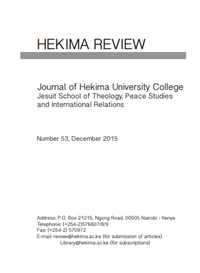Hekima Review No. 53 (Dec 2015)

On 12th December 2015, 195 countries adopted a universal, legally binding climate change agreement in Paris, France. The purpose of the Paris Agreement is to provide an action plan that will help enhance the implementation of the United Nations Framework Convention on Climate Change (UNFCC) by limiting global average temperatures to below 2 degrees Celsius above pre-industrial levels, with a further aim of limiting the increase to 1, 5 degrees Celsius. Key among the elements of the Paris Agreement are mitigation measures to reduce emissions, with countries submitting comprehensive national climate action plans known as Nationally Determined Contributions (NDC), that detail each country’s “ambitious” contributions towards achieving the goal of reducing emissions. The Paris Agreement will govern emission reductions from 2020, the year in which it will enter into force. However, for it to enter into force, it will require ratification by 55 countries that together account for at least 55% of global greenhouse gas emissions.

